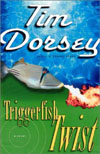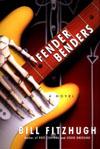
Comment
on this story
|
 |

Two comedic mysteries local Chambers of Commerce wouldn't want you to read
by Paul Lewis
The comedic crime novel is a tough sell in a tough market. Sure, almost ANY book has comic relief, but in a genre where even serious work is usually considered light beach-reading, at best, concerning oneself with yuks over police procedure can quickly put a writer into a dicey proposition, sales-wise. So if they're going to be funny, they had darn well better be funny.
Two recent releases succeed admirably in making a reader laugh at carnage and mayhem, and they succeed not by being great crime novels, but by utilizing distinct environments and constructing deft frameworks of plot in which colorful characters can romp around before everything inevitably goes to hell.
They're literally going to hell if you believe Florida's Agent Mahoney, a law-enforcer who studies the Book of Revelation so he'll be prepared for the inevitable rise in crime such an event would trigger. Mahoney's on the trail of Serge Storms, Tim Dorsey's literally insane yet charismatically compelling criminal creation in Triggerfish Twist (Morrow, $24.95). The manhunt, the  traditional ur-plot of many a crime novel, is perhaps the least-important facet of the book, which Dorsey describes as "my anti-rhapsody to the typical American neighborhood in general, and the typical Florida neighborhood in particular." traditional ur-plot of many a crime novel, is perhaps the least-important facet of the book, which Dorsey describes as "my anti-rhapsody to the typical American neighborhood in general, and the typical Florida neighborhood in particular."
Triggerfish isn't exactly a prequel, isn't exactly a sequel to Dorsey's first book, Florida Roadkill. Rather it's lodged somewhere in the middle of that fevered comic treasure—right before most of that book's protagonists die. After Serge's compatriots, the perpetually stoned Coleman and the manic crack whore Sharon, burn down their hideout and a large section of historic Tampa Bay, Serge and company take shelter on dysfunctional Triggerfish Lane amongst busybody retirees, druggie college students, a tyrannical, lawn-obsessed Little League coach, and people who never leave their homes. Serge fixates on the newest domestic arrival, Jim Davenport, an unassuming nice guy consultant who happens to kill a hardened criminal, incurring the wrath of said baddie's siblings. I could go on and on, detailing character after character, but believe me, it all makes incendiary sense.
Dorsey's gift is for building absurd situations that aren't that far removed from the way things really go down (especially in Florida), and then spinning them until they all ricochet off each other and end up in a big messy pile. You read Dorsey's books because of the reason most people watch NASCAR—you're just waiting to see something go fast, then crash, then burn, then explode.
A little closer to home, Mississippi native Bill Fitzhugh pokes his finger at Nashville's Music Row and realizes it doesn't take much pressure to make a few dents in the double entendre'd Fender Benders (Morrow, $24.00). Eddie Long is one of the most promising talents to come down the country music backroads in ages. He's handsome, shrewd, and he can even write a song or two. Big Bill Herron and Franklin Peavy are sparring analog vs. digital production/promotion gurus whose collective prestige is on the wane. Jimmy Rogers is a freelance writer who's been following Eddie's career  through the frat house and honky tonk circuit who thinks a biography of the wunderkind would make his career, especially since Eddie's best song is written right after his long-suffering wife dies under more than suspicious circumstances. Throw in a bundle of done-wrong songwriters, former rhythm and blues sensations turned restauranteurs, golddigging girlfriends, meaningless and repetitive award shows, and underhanded everybodies, all served up with vacant promises and rehearsed smiles, and you might get a feel for Nashville. Oh yeah, and Fender Benders, too. through the frat house and honky tonk circuit who thinks a biography of the wunderkind would make his career, especially since Eddie's best song is written right after his long-suffering wife dies under more than suspicious circumstances. Throw in a bundle of done-wrong songwriters, former rhythm and blues sensations turned restauranteurs, golddigging girlfriends, meaningless and repetitive award shows, and underhanded everybodies, all served up with vacant promises and rehearsed smiles, and you might get a feel for Nashville. Oh yeah, and Fender Benders, too.
Fitzhugh's brand of comedy is a little more subtle and organic than Dorsey's, but he nevertheless meets the "Is it funny?" challenge head-on. He builds his characters thoughtfully, warts and all, and manages to evoke genuine warmth for a few of them. There's a serial killer roaming in the background as a plot spur, but Fitzhugh's impetus is to illustrate the omnipresence of human greed and fraudulence as filtered through one of the most corrupt yet colorful industries known to man. Not just music. Country music. And if he can get you to giggle while nodding your head in the "Yep, I've seen that before" affirmative, he's done his job admirably. You'll do both, a lot, guaranteed.
The observational humor of both books, though far different in tone and execution, is the perfect salve for both someone who looks on these places with fondness from afar, and someone who absolutely reviles them. If you have to live in Florida or Nashville, however...my condolences.

August 29, 2002 * Vol. 12, No. 35
© 2002 Metro Pulse
|